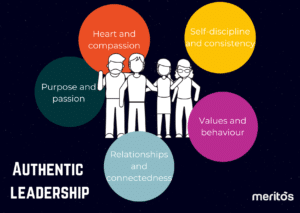We’ve all heard the idiom, “just be yourself” but what does this actually mean for authentic leadership and and can being truly authentic hinder or help your ability to lead people?
A study in the Leadership and Organisation Development Journal discovered that authentic leadership has a positive impact on work-related attitudes and happiness and is the strongest predictor of job satisfaction. The Harvard Business Review supports this study with research that found authenticity in the workplace leads to improved relationships with colleagues, greater productivity, a positive working environment and higher levels of trust.
Harvard Business Review also considers authentic leadership as the “gold standard”.
What is authentic leadership?
Let’s jump in with what authentic leadership actually is and how it can help engage and motivate your employees and build their trust and confidence.
Almost 20 years ago, a Harvard Business School Professor, Bill George, popularised the term, authentic leadership, which models a leader’s authentic behaviour on:
purpose and passion,
values and behaviour,
relationships and connectedness,
self-discipline and consistency, and
heart and compassion.
Leaders are not necessarily born with these five components but rather spend time developing, learning and relearning these skills to become more authentic. This in itself is quite the contradiction because being authentic by definition should be a natural sense of self but simply being yourself is actually problematic as a leader.
So why do leaders struggle with being authentic?
Workplaces are dynamic and evolutionary places where organisational cultures are complex, there are competing demands from team members and stakeholders and being completely honest and transparent can be problematic. We all have a variety of personas depending on situations, for example, who you are at home with your family differs greatly from who you are in a work meeting or how you behave with friends.
Being truly authentic in the workplace means your work persona could clash with your private sense of self, similarly we may present ourselves on social media in one way but behave differently in real life. These clashes can cause distrust for employees or stakeholders but in reality, we are actually being authentic, it is just the context changes.
Cultural norms also create tensions between how we should behave and our authentic self and in the global business world most leaders operate in, it is unrealistic to expect an authentic leader not to adapt to respect a particular cultural norm – but where is the authenticity in that? This struggle can also occur internally when leaders fear exposing their real or imagined weaknesses as this could lose respect from their peers and employees.
To be an authentic leader is not just “be yourself”, it is complex work but we’ve listed some great strategies to help you develop authenticity in leadership.
Tips for authentic leadership
At the core of authentic leadership is genuineness, which means every authentic leader is different and will approach situations differently. There are many myths around being a great leader, particularly that leaders should be inspirational, unwavering, unrelenting and show no signs of personal weaknesses. These myths are not only unrealistic for leaders but also very unauthentic so we’ve listed our top five tips for helping to develop authenticity in leadership and cultivate trust with your employees.
Be self-aware and self-reflect
Learn to listen to yourself. What are your emotional triggers or behaviours that provoke negative responses or make you feel uncomfortable? What situations do you thrive in? Learning and understanding your feelings, thoughts and actions is critical to being authentic. It is also important to remember that there is no destination with self-awareness, it is a continual journey of growth and change.
Know your values and understand your strengths
What are your core values and fundamental beliefs? What qualities define you as a leader or you aspire to develop? Make sure you regularly check in with yourself to see if you still are still in alignment with your core values and beliefs. Learn your strengths and understand your weaknesses. Knowing your values and understanding your strengths ensures consistency in your leadership and gives confidence and develops trust with your employees.
Develop your emotional intelligence
One of the key assets to being an effective leader is emotional intelligence. This is your ability to understand and manage the emotions of yourself and others. Developing your emotional intelligence helps to motivate yourself and others, build strong relationships with those around you and promotes resilience and confidence, which all help you to thrive as your authentic self.
Get to know your team
It is not enough to just know your team or employees on the surface. Spend time understanding their values, what makes them tick, what they find challenging and their successes. Learning more about those around you helps develop a deeper connection with others and also a greater understanding and appreciation of their struggles and triumphs. It also gives your employees the confidence to have a voice and speak up when necessary.
Grow your support network
Find a mentor or colleague that you trust and can confide in to provide you with honest feedback and support. This feedback will help you understand yourself better and provide you with guidance on your journey to authentic leadership.
Authentic leadership will always be a work in progress and not necessarily because your true self needs to constantly change but because 100% authenticity is not the goal and is not possible. We are always learning, changing and adapting and there will be moments when we are inauthentic or disingenuous.
The strategies we’ve shared all lead towards authenticity and while the challenges may be difficult and the individual rewards few, the fulfillment of leading and empowering a team or organisation to achieve a worthy and substantial goal is where real inner satisfaction lies – and that is the mark of an authentic leader.
















